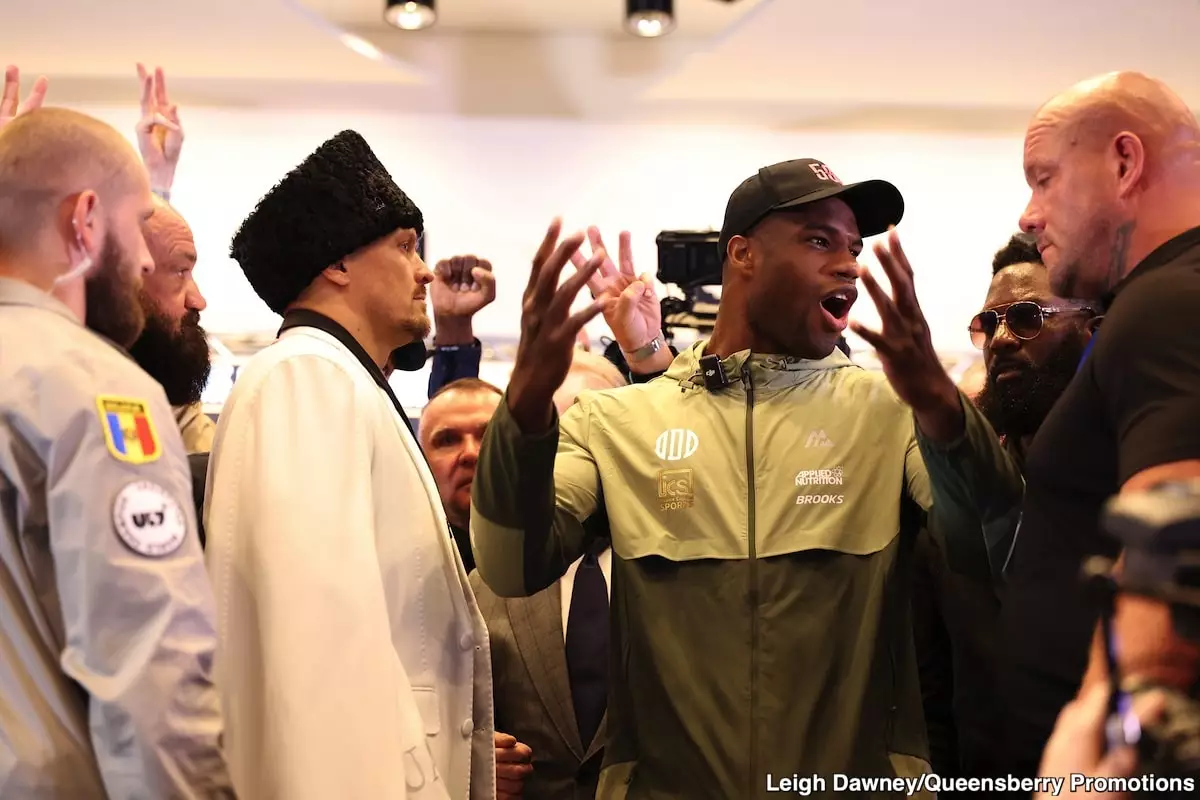In the world of boxing, public bravado often masks underlying insecurities. Daniel “Low Blow” Dubois’s most recent assertions highlight a curious mix of bravado and stagnation. For over a year, he’s been steadfast in denying that his loss to Oleksandr Usyk was due to a low blow—a narrative that has grown tiresome and increasingly hollow. His latest response to critics and critics’ bets reveals a fighter still grappling with doubt, trying to convince himself as much as the audience. The repeated insistence on his focus and readiness seems less a declaration of confidence and more a desperate attempt to mask fears of repeating past mistakes.
Dubois’s rhetoric, however, is hardly convincing. His statement that “they can bet all they like. It does not mean sh** to me” sounds more like a defensive retreat than a confident retort. After all, bets are a reflection of what others believe, and his history suggests he might be betting more on hope than on proven form. His past performances, especially the vulnerability exposed when Usyk cracked him in nine rounds, highlight a fighter still in development but reluctant to admit he might need more time or training to reach the elite level.
Contrasting Confidence: Canelo’s Bold Prediction and Its Implications
Meanwhile, Canelo Alvarez’s public backing for Oleksandr Usyk adds a fascinating layer to this narrative. Unlike Dubois, Canelo’s demeanor was unapologetically direct. He placed a hefty wager—$500,000—on Usyk to finish what he started. His rationale was simple: Usyk embodies a masterful blend of stamina, technical prowess, and mental acuity. Canelo’s confidence isn’t built on empty bravado but on an acute understanding of Usyk’s ability to dominate opponents with surgical precision and resilience.
This external validation sharply contrasts Dubois’s prolonged complaints about external factors like low blows. Canelo’s unwavering support and sizable bet signal a belief that Usyk is not just a favorite but probably unbeatable in this matchup. It’s a tacit rejection of Dubois’s chances, implying that the heavyweight challenger, despite his size, is outclassed in skill and experience. That Bet from Canelo isn’t mere entertainment; it’s a statement that the boxing world largely views this fight as a foregone conclusion—one more chapter in Usyk’s reign at the top.
Empty Promises and the Reality of the Heavyweight Landscape
Dubois’s ongoing claims of transformation and readiness seem increasingly disconnected from reality. Boxers often proclaim their evolution after setbacks, but their actions and performances paint a clearer picture. In his career, Dubois has only recently amassed a record against relatively unknown opponents, none of whom serve as credible tests for a top-tier heavyweight. His nickname, still shadowed by past shortcomings, offers little reassurance to fans hoping for a genuine comeback.
This isn’t just about a boxing match; it’s about the credibility of a fighter at a critical juncture. Dubois faces a decisive moment: either prove that he’s more than a puncher with a soft core or continue to falter under the weight of unmet expectations. His claim to be “the young lion” eager to take over sounds more like a desperate plea for relevance than genuine belief in himself. The stakes are high, not only for the boxer but for the narrative that surrounds him. Will he seize this chance to change his fortunes, or will he crumble under the pressure, repeating his history of excuses and fading into obscurity?
The Reality Check: Who Holds the Power at Wembley?
As the fight night approaches at Wembley Stadium, the contrast couldn’t be starker. Usyk, with an undefeated record and multiple belts, embodies the efficiency and mastery that most boxing fans admire. His record, sharing only a handful of rounds lost, embodies consistency and dominance. Dubois, on the other hand, is walking into the ring with fragile momentum, claiming to be ready but yet to demonstrate it.
The excitement and anticipation are tinged with skepticism. Dubois’s self-assurance might be a mask for nerves; his past performance suggests vulnerability. How he manages the initial rounds will be critical. Historically, fighters with confidence but shaky fundamentals tend to crumble under elite pressure. If Dubois can’t demonstrate resilience early, the fight will likely mirror previous disappointments.
Canelo’s bet and confidence, meanwhile, serve as a psychological shadow over Dubois. The narrative is simple: the betting odds favor Usyk, and the betting agreement from Canelo acts as a subtle yet powerful endorsement of that belief. It raises an essential question: is Dubois fighting to validate himself or merely to avoid further humiliation? The answer will be etched into the outcome of the bout and perhaps define the trajectory of his career for years to come.
His words about “taking over” and “becoming the man” ring hollow in the face of facts. Sometimes, in boxing, words are simply smoke screens, obscuring the reality that talent, preparation, and mental fortitude are the true measuring sticks. On the night at Wembley, those factors will be put to the test—whether Dubois can back his talk or if he will fade once again when confronted with true adversity.

